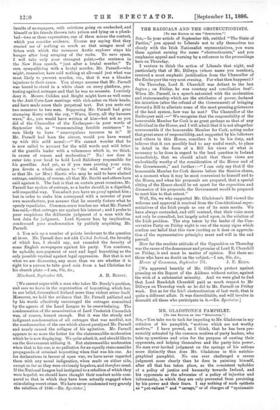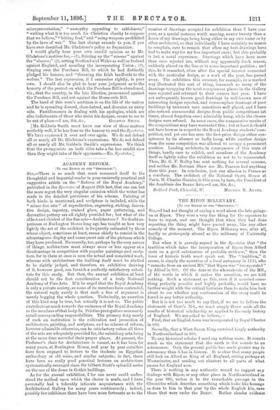MR. GLADSTONE'S PAMPHLET.
[To THE EDITOR OF THE " SPECTATOR."] SIR,—You take me to task for imputing to Mr. Gladstone in my criticism of his pamphlet, " motives which are not worthy motives." I have proved, as I think, that he has been pre- sumably actuated by the common motives of party leaders, who take up questions and cries for the purpose of ousting their opponents, and helping themselves and the party into power. No man ever invited judgment on the springs of his actions more distinctly than does Mr. Gladstone in this autobio- graphical pamphlet. No one ever challenged a severe judgment more clearly than he does in painting himself, after all that has taken place, as the consistent upholder of a policy of justice and humanity towards Ireland,- and his opponents as the advocates of a policy of injustice and inhumanity, in which they are only prevented from persisting by his power and their fears. I say nothing of such epithets as " pot-valiant " and " savage," or of charges of "systematic misrepresentation," " unworthy appealing to selfishness," 4' writing what it is too much for Christian charity to suppose that we believe," "hitting foul," and "using weapons prohibited by the laws of war." The last charge extends to you, if you have ever described Mr. Gladstone's policy as Separation.
I would gladly hear your own candid opinion as to Mr. Gladetone's motives for,—(1), Stirring up the " masses " against the "classes ;" (2), setting Scotland a-id Wales as well as Ireland against England, and assailing the incorporating Union ; (3), flinging over the Purchase Bill, to which he had distinctly pledged his honour, and "throwing the Irish landlords to the wolves." The last expression, if I remember rightly, is your -own. I should also be glad to hear your judgment as to the honesty of the pretext on which the Purchase Bill is abandoned, viz., that the country, in the late Election, pronounced against the Purchase Bill, and not against the Home-rule Bill.
The hand of this man's ambition is on the life of the nation and he is spreading discord, class-hatred, and disunion on every side. Fastidiousness in dealing with his apologies, which are also indictments of those who resist his designs, seems to me to be out of place.—I am, Sir, &c., GOLDWIX SMITH.
[Mr. Goldwin Smith must know our view of these matters perfectly well, if he has done us the honour to read the Spectator. We have expressed it over and over again. We do not defend all or nearly all Mr. Gladstone's expressions. We do not defend all or nearly all Mr. Goldwin Smith's expressions. We think that the protagonists on both sides take a far less candid view than they might take of their opponents.—En. Spectator.]



































 Previous page
Previous page